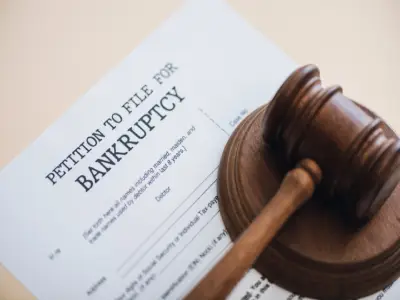Phoenix Bankruptcy Lawyer
If you have huge debts that you are unable to repay, are behind on your mortgage payments and at risk of foreclosure, are being hounded by bill collectors, or all of the above, declaring bankruptcy may be your best option. Or it may not be. But you’re wondering, “Should I file bankruptcy now or wait?”
The timing of a bankruptcy filing can have a massive impact on your future and should be approached with caution and deliberation. Before making such a decision, it is wise to consult with a Phoenix bankruptcy attorney.
Do you live in Phoenix, Arizona, and think about filing for bankruptcy? Then naturally you have some questions. Please contact Phoenix Fresh Start Bankruptcy Attorneys immediately to schedule a free, no-obligation, stress-free financial analysis with one of our consultation attorneys. We’ll take the time to answer your questions and go through your options. It will not cost you anything, but the benefits of debt relief will be priceless.
Should I File Bankruptcy Now or Wait?
 In certain cases, delaying filing for Chapter 7 or Chapter 13 bankruptcy in Arizona makes perfect sense. Filing for bankruptcy too soon might result in the loss of property you would otherwise be allowed to retain or force you to apply for Chapter 13 rather than Chapter 7.
In certain cases, delaying filing for Chapter 7 or Chapter 13 bankruptcy in Arizona makes perfect sense. Filing for bankruptcy too soon might result in the loss of property you would otherwise be allowed to retain or force you to apply for Chapter 13 rather than Chapter 7.
In other instances, you may be able to avoid bankruptcy by dealing with your debt in other ways. Continue reading this article to learn more about numerous instances in which it may be beneficial to delay bankruptcy.
When is it Beneficial to Delay Filing Bankruptcy in Arizona?
When You Have the Opportunity to Make Modifications Your Mortgage
Many people nowadays file for bankruptcy in order to delay a foreclosure. While bankruptcy might be a sensible option, in this case, many people file for bankruptcy much too soon, making it more difficult to secure a mortgage modification. Many lenders may refuse to participate in or continue mortgage talks if you file for bankruptcy.
Because your bankruptcy will eliminate the promissory note portion of your mortgage (although not your house lien), nothing will be left to negotiate. If you think you will want to modify your mortgage someday, you should probably avoid bankruptcy, at the very least until after you know how the mortgage modification market is doing.
If your Most Recent Income was High
The Arizona bankruptcy court will use what is known as the “means test” to establish your eligibility when you file for Chapter 7 bankruptcy by looking at your income from the previous 6 months. If you have a significant income, you may only file for Chapter 13 bankruptcy, which compels you to pay a percentage of your debts.
If your salary has suddenly dropped due to a wage reduction or layoff, you may be able to qualify for Chapter 7 by just waiting a couple of months. After several months of lower income are included in the means test, your income average from the previous 6 months might be small enough to qualify.
Suppose your typical gross income over the past 6 months was $8,000 each month, but you were recently laid off and now currently receive $1,500 every month from unemployment. If you wait 2 months before filing, your 6 months average gross income will fall from $8,000 to below $5,900 a month, placing you in Chapter 7 bankruptcy eligibility through the majority of states.
When You Own Arizona Property That You Do Not Want to Lose
You may own property that you do not want to lose under a Chapter 7 bankruptcy if you decide to file now, but can retain it if you wait — or have time for selling and using the proceeds. As an example:
Tax Refunds
Assuming you are receiving a $4,000 tax refund. If you receive it after filing, you must give it over to the trustee in bankruptcy. But if you receive your tax refund first, spend it on necessities over a couple of months, then file bankruptcy, you would get the full value of the refund.
Property that Exceeds the Exemption Maximum
Assuming you own assets worth more than what you may be able to retain in bankruptcy due to “property exemptions.” Waiting a few months to file may decrease the property’s value low enough to qualify for a property exemption.
Non-exempt Assets
Assuming you own non-exempt assets means the bankruptcy trustee may seize and sell your properties to pay your creditors. (Things besides your home, vehicle, household items, clothes, and other essentials are often nonexempt.)
Should you sell your property at its fair market price before declaring bankruptcy and then use the proceeds on essentials, you will be the one to benefit from the property instead of your creditors. (Alternatively, you may be allowed to use the funds to purchase property that is exempt from being auctioned in bankruptcy, like a burial site or a car, but consult with a lawyer first, since this might put you in hot water in certain cases.)
If You Expect to Have More Debts Soon
If you anticipate any big expenses in the foreseeable future, you should postpone bankruptcy filing. In general, Chapter 7 only discharges debts owed as of the date of filing. Debts that arise afterward will be your responsibility to pay, often for years. For instance, if you are scheduled to undergo a knee replacement procedure within the coming year and must pay part or all of the costs, these expenses will then be wiped away if you file for bankruptcy under Chapter 7 after your knee operation.
I Transferred Property to Someone. Should I File Bankruptcy Now or Wait?
It all depends. There are legitimate grounds for transferring property prior to filing for bankruptcy in Arizona. However, if you transfer property away from your name before filing bankruptcy, the trustee may be able to undo the transfer and reclaim the property to benefit of your creditors.
The Trustee’s Ability to Reverse the Transfer of Property is Heavily Dependent on Several Factors:
- if you planned to engage in bankruptcy fraud,
- whether you transferred or sold the property at a price below its fair market value,
- what you bought with the proceeds of the sale,
- when the transfer happened.
Arizona Property can be Sold to Pay Bills
Property transfers are not always bad. You may certainly sell a boat, car, guitar, or any other asset you possess to pay necessary expenses, like rent or utility bills, or to purchase food or warm clothing.
If you intend to declare bankruptcy shortly after that, a problem can usually be avoided by doing the following:
- sell the property for its market value, and
- keep records proving that the proceeds were used to acquire essential things
When filing for bankruptcy, plan to mention the property transfer. You should also bring your documents to the 341 meeting of creditors in order that you can answer any questions from the bankruptcy trustee chosen to manage your case.
Property Transfers can be Reversed by the Trustee in Bankruptcy
Even though the trustee cannot object to your discharge for the reasons stated above, the trustee may be entitled to reclaim an asset that you transferred from your name if:
- the transfer occurred within 2 years of your filing bankruptcy or during the period provided by state law for setting aside an unlawful transfer, whichever one is longer, and
- your transfer of property was with the intention of defrauding, delaying or impeding your creditors, or
- you sold the property for less than its value while you were bankrupt or planned to assume additional debt that you could not afford to repay.
And if you transferred the property more than a year before filing for bankruptcy, a trustee in a Chapter 7 bankruptcy case might nevertheless take it back, liquidate it (assuming the property isn’t protected by your state’s exemption legislation), and divide the revenues to your creditors. However, if you transferred an asset without equity or if you can have it exempted in your bankruptcy, the trustee is unlikely to try to prevent the transfer.
Postponing a Bankruptcy in Order to Protect a Property Transfer
If you make a transfer that might result in losing your discharge or enabling the trustee to reclaim your property, postponing your bankruptcy could shield you from these unfavorable repercussions. However, it is not recommended unless such a transfer is necessary to pay for essential products.
Keep in mind that however long you wait to file, if you meant to conduct bankruptcy fraud, you can be charged with a serious offense, get in a lot of trouble, and face criminal prosecution. If you have transferred property and you are thinking of filing bankruptcy, consult with an experienced bankruptcy attorney.
Affordable Bankruptcy Attorney in Phoenix, Arizona
Get out of debt and start living your best life now! Our experienced bankruptcy attorney at Phoenix Fresh Start Bankruptcy Attorneys work with families in Phoenix, Goodyear, Oro Valley, and Tucson, Arizona who are facing repossession, foreclosure, wage garnishment or credit card debt. Our costs for Chapter 7 and Chapter 13 bankruptcy are affordable. Our payment plan makes it easy to pay your legal advice fees in installments both pre-filing and post-filing.
Call us now to schedule a free, no-obligation, stress-free financial analysis!











